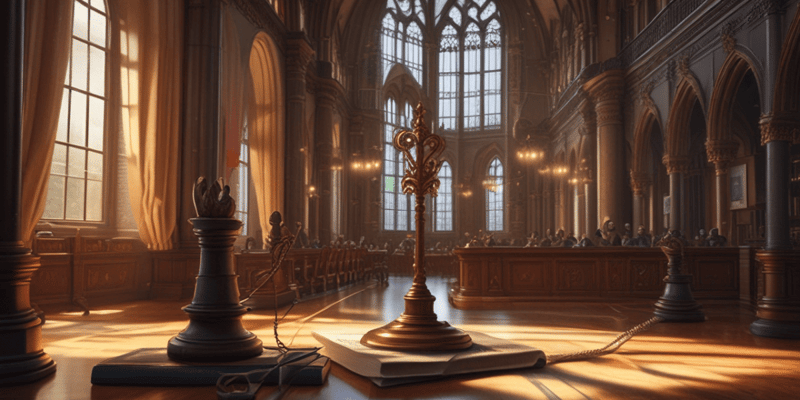9 Questions
What is the primary purpose of the International Court of Justice?
What was the predecessor of the International Court of Justice?
How many judges are there in the International Court of Justice?
What is the official language of the International Court of Justice?
What is the main limitation of the International Court of Justice's enforcement powers?
What is the main source of the International Court of Justice's authority?
What is the purpose of ad hoc judges in the International Court of Justice's procedure?
How many cases has the International Court of Justice entertained as of January 2023?
What was the first permanent institution established for the purpose of settling international disputes?
Summary
The International Court of Justice (ICJ) is the primary judicial organ of the United Nations (UN), settling disputes between states in accordance with international law and giving advisory opinions on international legal issues.
The ICJ is the successor of the Permanent Court of International Justice (PCIJ), which was established in 1920 by the League of Nations, and the Statute of the ICJ draws heavily from that of its predecessor.
The ICJ consists of a panel of 15 judges elected by the UN General Assembly and Security Council for nine-year terms, with judges collectively reflecting the principal civilizations and legal systems of the world.
Since the entry of its first case in 1947, the ICJ has entertained 186 cases through January 2023, making it the only international court that adjudicates general disputes between countries.
The court is located in the Peace Palace in The Hague, Netherlands, and its official working languages are English and French.
The Permanent Court of Arbitration was the first permanent institution established for the purpose of settling international disputes, created by the Hague Peace Conference of 1899.
The unprecedented bloodshed of the First World War led to the creation of the League of Nations, which called for the establishment of a Permanent Court of International Justice (PCIJ), responsible for adjudicating any international dispute submitted to it by the contesting parties.
In 1942, the United States and United Kingdom jointly declared support for establishing or re-establishing an international court after the war, and in 1943, the U.K. chaired a panel of jurists from around the world, the "Inter-Allied Committee", to discuss the matter.
Following a peak of activity in 1933, the PCIJ began to decline in its activities due to the growing international tension and isolationism that characterized the era.
The ICJ's workload covers a wide range of judicial activity, and its composition consists of judges elected regardless of their nationality among persons of high moral character who are either qualified for the highest judicial office in their home states or known as lawyers with sufficient competence in international law.
In its 77 years of history, only five women have been elected to the Court, with former UN Special Rapporteur Philip Alston calling for states to take seriously questions of representation in the bench.
Article 31 of the statute sets out a procedure whereby ad hoc judges sit on contentious cases before the court, and the system may seem strange when compared with domestic court processes, but its purpose is to encourage states to submit cases.Overview of the International Court of Justice
- The International Court of Justice (ICJ) is the principal judicial organ of the United Nations (UN), established in 1945.
- The current composition of the ICJ includes 15 judges, elected by the UN General Assembly and the Security Council for nine-year terms.
- The court has jurisdiction over disputes between states that agree to submit to its rulings, as well as the power to issue advisory opinions on legal questions referred to it by certain UN bodies.
- In contentious cases, only states may be parties, but non-state interests may be the subject of proceedings.
- The court applies international law, including conventions, customs, and general principles of law, as well as academic writing and previous judicial decisions.
- The court has been criticized for its rulings, procedures, and authority, and its enforcement powers are limited by the willingness of parties to comply and the UN Security Council's ability to take enforcement action.
- The court's decisions bind only the parties to a particular controversy and have no binding effect on other states or future cases.
- The ICJ has dealt with about 180 cases, including disputes related to territorial sovereignty, maritime boundaries, and diplomatic protection.
- The court's procedure involves written memorials, public hearings, and judgments, which may include concurring or dissenting opinions from individual judges.
- Parties may seek provisional measures to protect the status quo pending the hearing of a case, and third states may apply to intervene in cases in which their interests are affected.
- The court's authority derives from the consent of states to its jurisdiction and the respect accorded to its legal reasoning embodied in its judgments and advisory opinions.
- The court's decisions are binding and final, and parties are obliged to comply with them under the UN Charter, although enforcement is limited.
Description
Test your knowledge of the International Court of Justice (ICJ) with this informative quiz! Discover the history of the ICJ, its role in settling disputes between states, and its jurisdiction over international law. Challenge yourself with questions on the ICJ's composition, procedures, and landmark cases. From territorial sovereignty to diplomatic protection, this quiz covers it all. Whether you're a legal expert or simply curious about international law, this quiz is sure to test and expand your knowledge of the ICJ.


